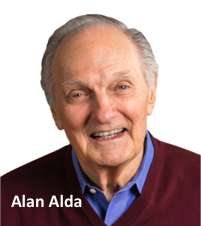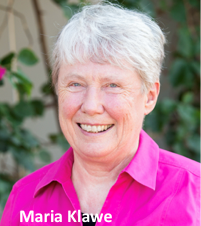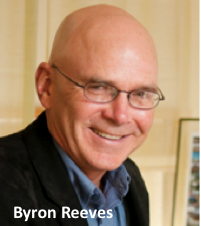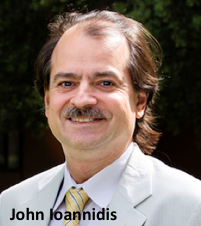2018 AJN Awards
Science Awareness Award
Communicating complex science topics in innovative, engaging ways
ALAN ALDA, CO-FOUNDER AND ADVISORY BOARD MEMBER OF THE CENTER FOR COMMUNICATING SCIENCE, STONY BROOK UNIVERSITY
As the host of Scientific American Frontiers, a television show that explored cutting-edge advances in science and technology, Alda concluded that scientists and doctors struggle to get their message to the public. He co- founded the Alan Alda Center for Communicating Science in 2009 at Stony Brook University to use his expertise in acting and communication to help scientists communicate more effectively to the public, policymakers, students, funders, and the media. Since its founding, the Center has trained over 11,000 doctors and scientists to be world-class communicators, beginning each course with improv studies and practice.
Alda shared the following: “I related to scientists in a conversational way from the Frontiers show; scientists are happy to come out of their shell—they’re funny, they’re ambitious, they’re people too. Wouldn’t it be fun to have them become conversational? Unpopular at first with the faculty (it took time from “real science”), but now we cannot keep up with demand. We try very hard to certify teachers for our methods, we’ve certified about thirty trainers at this point. The first half-day is teaching improv.

Science Inspiration Award
Unsung heroes inspiring potential leaders

MARIA KLAWE, PRESIDENT, HARVEY MUDD COLLEGE
Dr. Klawe is a renowned lecturer at international conferences, national symposia, and colleges across the U.S. and Canada, discussing diversity in science, technology, engineering, and mathematics disciplines in STEM industry and education. She received the 2014 Women of Vision ABIE award, and the Carnegie Institute’s 2017 Academic Leadership Award. Long passionate about improving K-12 science and mathematics education, Dr. Klawe is recognized for increasing the percentage of Harvey Mudd computer science female graduates from 10% in 2006 to over 50% in 2018 during her tenure as President. Klawe noted that “the largest share of the credit for this remarkable change is due the CS faculty.”
She is a fellow of the American Academy of Arts and Sciences, a Mathematical Sciences Research Institute trustee, and past president of the Association for Computing Machinery. Before arriving at Harvey Mudd in 2006, she served as dean of engineering and professor of computer science at Princeton University.
Science for Society Award
Recognizing individuals making impacts in social media, film, books
BYRON REEVES, PROFESSOR OF COMMUNICATIONS, STANFORD UNIVERSITY
Professor (by courtesy) in the Stanford Graduate School of Education, and a Fellow in the Precourt Institute for Energy. He has been director of the Center for the Study of Language and Information, and co-director of the H-STAR Institute (Human Sciences and Technologies Advanced Research) at Stanford.
Stanford is unique among its peer institutions in having seven schools colocated on one contiguous campus, each with exceptional breadth and depth of excellence. This naturally facilitates multidisciplinary collaboration. The Award honors Dr. Reeves as the founding faculty Director of Stanford’s MediaX, a university-industry partnership program launched in 2001 to facilitate interdisciplinary discussion and research at the intersection of academic and applied interests. Hosting over 100 industry and government partners, MediaX research initiatives have fueled numerous Stanford faculty in diverse areas of research across every Stanford school.

Science Courage Award
Recognizing those who speak out to correct a misimpression or right a wrong

JOHN IOANNIDIS, PROFESSOR OF MEDICINE, STANFORD UNIVERSITY
C.F. Rehnborg chair in Disease Prevention, Professor of Health Research and Policy, and Professor (by courtesy) of Biomedical Data Science at the School of Medicine, Professor (by courtesy) of Statistics at the School of Humanities and Sciences, co-Director of the Meta-Research Innovation Center at Stanford, and Director of the PhD program in Epidemiology and Clinical Research.
Internationally recognized as a leader in assessing biases, replication, and reliability in research findings in biomedicine and beyond, Ioannidis’ PLOS Medicine paper (2005), “Why Most Published Research Findings are False,” has been the most accessed article in the Public Library of Science history (over 2.5 million hits). David Freeman, in The Atlantic, penned that Ioannidis is a “meta-researcher, having shown, again and again, and in many different ways, that much of what biomedical researchers conclude in published studies is misleading, exaggerated, and often flat-out wrong.” Ioannidis, one of the most influential scientists alive, has shown and continues to exhibit startling courage in these pursuits.
See John Ioannidis in his talk “COVID-19: Understanding the Disease Through Data”, part of the series “Issues, Approaches and Consequences of the COVID-19 Crisis”, sponsored by Novim and UCSB.
